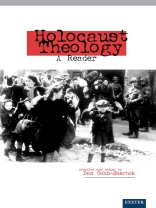Where was God when six million died? Over the last few decades this question has haunted both Jewish and Christian theologians. If God is all-good and all-powerful, how could he have permitted the Holocaust to take place?
Holocaust Theology: A Reader provides a panoramic survey of the responses of over one hundred leading Jewish and Christian Holocaust thinkers. Beginning with the religious challenge of the Holocaust, the collection explores a wide range of thinking which seek to reconcile God’s ways with the existence of evil. In addition, the book addresses perplexing questions regarding Christian responsibility and culpability during the Nazi era. Designed for general readers and students, the readings are arranged thematically and each one is divided into separate topics. For anyone who is troubled by the religious implications of the tragedy of the Holocaust, this collection of Holocaust theology provides a basis for discussion and debate: each reading is followed by several questions designed to stimulate this.
Table des matières
Part 1 The challenge: the religious challenge of the Holocaust.
Part 2 Faith in the death camps: religious faith; the Holocaust and divine providence; the Holocaust and mystery; faithfulness and suffering.
Part 3 Wrestling with the Holocaust: the suffering of God; human free will; the Holocaust and Christian faith; the Holocaust and the kingdom; the Holocaust and covenant; the Holocaust and human evil; the Holocaust and Jewish survival; reconstructing Judaism.
Part 4 Jews, Christians and the Holocaust: the Holocaust and Christian responsibility; re-evaluating Christian theology; Jewish-Christian dialogue.
Epilogue – the future of Holocaust theology.
A propos de l’auteur
Dan Cohn-Sherbok is Professor of Judaism at the University of Wales and Visiting Professor of Interfaith Dialogue at Middlesex University. He is the author and editor of over 60 books, including The Crucified Jew, Understanding the Holocaust, The Atlas of Jewish History and Messianic Judaism.







![Couverture du Brian Schrag & Julisa Rowe: Community Arts for God's Purposes [Chinese] 貼近神心意的社群藝術 Couverture du Brian Schrag & Julisa Rowe: Community Arts for God's Purposes [Chinese] 貼近神心意的社群藝術](https://static.worldofdigitals.com/thumb_webp/740/9781645083740.webp)




